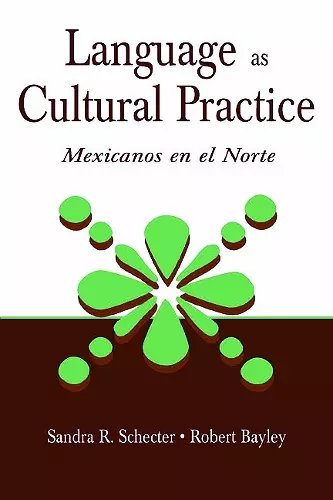Language as Cultural Practice
Mexicanos en el Norte
Robert J Bayley author Sandra R Schecter author
Format:Paperback
Publisher:Taylor & Francis Inc
Published:1st May '02
Currently unavailable, and unfortunately no date known when it will be back
This paperback is available in another edition too:
- Hardback£145.00(9780805835335)

Language as Cultural Practice:Mexicanos en el Norte offers a vivid ethnographic account of language socialization practices within Mexican-background families residing in California and Texas. This account illustrates a variety of cases where language is used by speakers to choose between alternative self-definitions and where language interacts differentially with other defining categories, such as ethnicity, gender, and class. It shows that language socialization--instantiated in language choices and patterns of use in sociocultural and sociohistorical contexts characterized by ambiguity and flux--is both a dynamic and a fluid process.
The study emphasizes the links between familial patterns of language use and language socialization practices on the one hand, and children's development of bilingual and biliterate identities on the other. Using a framework emerging from their selection of two geographically distinct localities with differing demographic features, Schecter and Bayley compare patterns of meaning suggested by the use of Spanish and English in speech and literacy activities, as well as by the symbolic importance ascribed by families and societal institutions (such as schools) to the maintenance and use of the two languages.
Language as Cultural Practice:
*provides a detailed account of the diversity of language practices and patterns of use in language minority homes;
*offers educators detailed information on the language ecology of Latino homes in two geographically diverse communities--San Antonio, Texas, and the San Francisco Bay Area, California;
*shows the diversity within Mexican-American communities in the United States--families profiled range from rural families in south Texas to upper middle class professional families in northern California;
*provides data to correct the prevalent misconception that maintenance of Spanish interferes with the acquisition of English; and
*contributes to the study of language socialization by showing that the process extends throughout the lifetime and that it is an interactive rather than a one-way process.
This book will particularly interest researchers and professionals in linguistics, anthropology, applied linguistics, and education, and will be useful as a text in graduate courses in these areas that address language socialization and learning.
"The authors present cogent and throughtful case studies that will provide an exciting basis for in-depth classroom discussion in courses dealing with language-minority students...The volume includes a comprehensive bibliography and is recommended for collections supporting work at the upper-division undergraduate level and above in linguistics, applied linguistics, education, and anthropology."
—CHOICE
"Educators will find this book extremely useful because it looks at the developmental and social aspects of bilingualism. It gives educators detailed information on language usage in Mexican-American families' homes...this book greatly enhances our understanding of bilingual development in the family and the dynamics of bilingual communities, shows diversity within Mexican families in the United States, provides evidence to correct the common misconception that maintenance of Spanish interferes with the acquisition of English, and finally shows the complex dynamics of language socialization. The book will be of use for researchers in linguistics and education, educators, and those interested in language socialization and learning."
—TESL-EJ
"The type of work described in this book is timely given the political mood in the United States around issues of bilingualism and English-only movements. It focuses on some of the concerns that cause controversy, including whether or not bilingualism is a detriment to children's academic progress. The book's scope and implications are indeed broad and far-reaching enough to appeal to a wide readership. As such, it will certainly benefit minority-language families through its powerful potential to effect policy change and thus foster the reconciliation of the goals and roles of school and family."
—TESOL QUARTERLY
"A hallmark of sociolinguistic research is the ability to present the complexity of human experience of language as well as its basic relevancy and immediacy to human lives. In other words, through sociolinguistics we can begin to grasp how language in so many ways and contexts shapes our lives every day as well as how our lives shape language. Language as Cultural Practice is a work of fine scholarship that enlightens us as much as it reminds us how much work remains to be done."
—Journal of Sociolinguistics
"This volume advances in significant ways our understanding of both bilingual development in the family and of the dynamics of bilingual communities....It follows in the tradition of Shirley Brice Heath's classic ethnography and the findings have similar relevance to literacy and language development in Latino/Latina communities as Heath's did for African-American communities."
—Jim Cummins
Ontario Institute for Studies in Education, University of Toronto
"The cultural practice approach to a comparison of Mexicano families in California and Texas, reported on with such sensitivity in this volume, is so welcome; it arrives not a moment too soon....Schecter and Bayley encourage all of us to become activists and partners in fighting narrow definitions of bilingualism that ignore a diversity of practices and exclude the views of those most directly affected. I, for one, am encouraged by their optimism about the possibilities of positive change because of the directions they chart for us in this insightful study."
—Ana Celia Zentella
University of California at San Diego, From the Foreword
ISBN: 9780805835342
Dimensions: unknown
Weight: 460g
248 pages